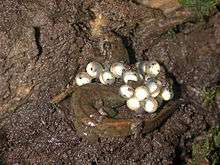Desmognathus fuscus
| Desmognathus fuscus | |
|---|---|
| | |
| Scientific classification | |
| Kingdom: | Animalia |
| Phylum: | Chordata |
| Class: | Amphibia |
| Order: | Urodela |
| Family: | Plethodontidae |
| Subfamily: | Plethodontinae |
| Genus: | Desmognathus |
| Species: | D. fuscus |
| Binomial name | |
| Desmognathus fuscus (Rafinesque, 1820) | |
| Synonyms | |
|
Triturus fuscus Rafinesque, 1820 | |

Desmognathus fuscus is an amphibian in the lungless salamander family. The species is commonly called the dusky salamander or northern dusky salamander to distinguish it from populations in the southern United States which form a separate species, the southern dusky salamander (D. auriculatus). It can be found in eastern North America from extreme eastern Canada in New Brunswick south into the panhandle of Florida and west to Louisiana. The size of the species' total population is unknown, but is assumed to easily exceed 100,000. The species' habitat differs somewhat geographically; dusky salamanders in the northern part of the range prefer rocky woodland streams, seepages, and springs, while those in the south favor floodplains, sloughs, and muddy places along upland streams. They are most common where water is running or trickling. They hide under various objects, such as leaves or rocks, either in or near water. Alternatively, they may enter burrows for protection. The dusky salamander lays its eggs close to water under moss or rocks, in logs, or in stream-bank cavities. The larval stage which follows is normally aquatic. Dusky salamanders are hidden from sight for 70% of their lives.
References
- Hammerson, G. 2004. Desmognathus fuscus (dusky salamander). 2006 IUCN Red List of Threatened Species. Retrieved 19 January 2009.
External links
- Dusky Salamander (Demognathus fuscus), Natural Resources Canada
